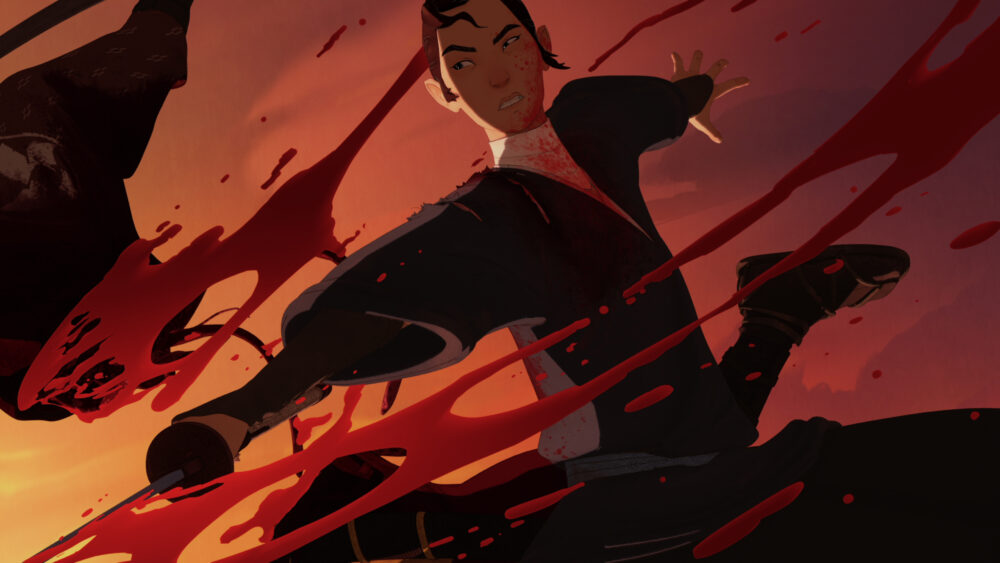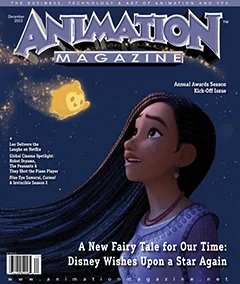|
Getting your Trinity Audio player ready...
|
Whether it’s international content like Bong Joon-Ho’s Parasite and the inexhaustible popularity of anime or American productions such as Everything Everywhere All at Once and Disney’s Turning Red, stories from Asia and the AAPI perspective have become cornerstones of today’s pop culture. With their new show, Blue Eye Samurai, co-creators Amber Noizumi and Michael Green and supervising director/producer Jane Wu (Mulan [2020], Guardians of the Galaxy) hope to provide audiences with a deeper insight into the AAPI experience. “This show is an authentic Asian American voice,” says Wu. “It’s not 100 percent culturally Japanese, but it’s our interpretation of our culture.”
‘This show is an authentic Asian American voice … It’s not 100 percent culturally Japanese, but it’s our interpretation of our culture.’
— Supervising director-producer Jane Wu
Blue Eye Samurai follows the adventures of Mizu (voiced by Maya Erskine), the eponymous katana-wielding warrior who wanders Japan in disguise during the Edo period of Japan’s 17th century. As a result of Japan closing its borders, a profound sense of nationalism within the country fosters a distaste for anything or anyone with a foreign origin, including the half-white Mizu. By tracking illegal European imports, Mizu embarks on a bloody mission to confront the four white traders who supply the country with contraband and who may also be responsible for the “impure” blood inside her veins.
“It was very important for me to make Mizu complex and deep so [that] you go, ‘Oh, I know somebody like that,’” says Wu. “You feel like you know her, and by the end of the series, you feel like you’ve gone through the journey with her.”

Behind Blue Eyes
It’s a time-honored tradition for Japanese swordsmiths to brand each blade with their insignia. In Netflix’s Blue Eye Samurai, the series’ meditative and introspective narrative serves as the signature of the husband-and-wife duo behind the show’s creation, Michael Green (Logan, A Haunting in Venice) and Amber Noizumi. “A lot of it was my personal experience growing up biracial,” says Noizumi. “Where I grew up … which was in Indio, California, there were very few Asians.”

Born to a Japanese father and a white mother, Noizumi encountered myriad disheartening experiences in her youth — including people believing she was adopted while running errands with her mother. Consequently, Noizumi developed “a low-level seething anger” that smoldered in the background of her life deep into adulthood. Upon the birth of her first daughter, Noizumi began to reevaluate her heritage with fresh eyes. “I was so excited to have this blue-eyed child, and it made me realize, ‘Why am I so excited about this?’” says Noizumi. “I had texted [Michael] one day when he was shooting something … and I sent him a picture of [our daughter’s] bright blue eyes, and Michael called her our blue-eye samurai. And he was like, ‘Oh, that’s a good title.’”
“If you were biracial in Japan when the borders were closed, someone would think you were pretty ugly,” says Noizumi. “All the things I did to try and make my eyes look bigger, like getting eye tape and putting on white eyeliner — all of these tricks to make your eyes look bigger— maybe somebody in that period would try to hide it. Maybe she would wear glasses to cover those blue eyes.”
During the project’s 15-year gestation period, Green and Noizumi began to feel as if Blue Eye Samurai might be impossible to produce until they arrived at the medium of animation. “We were having a conversation with our executive producer Erwin Stoff about animation in general … and something clicked,” says Green. “I think he used the term animated drama, and instantly it was like, ‘Oh my God, we can do Blue Eye Samurai that way.’”

The Art of Swordplay
Coming from the world of live-action, Noizumi and Green found themselves strangers in the exotic world of animation. “I think the biggest challenge was the learning curve for both of us,” says Noizumi. “We were like, ‘Yeah, we can go to Kyoto, and go to Edo, and go to this city, and build this castle, and [the animators] just have to draw it. That’s not a big deal, right?’ And only when we began to talk to people who knew things were they like, ‘Oh, no, that’s a big deal! These things cost time and they cost money.’”
For Green and Noizumi, supervising director Jane Wu became the perfect interpreter for the specificities of Blue Eye Samurai’s distinct visual dialect. “I’ve been in live action as long as I’ve been in animation, so I’m ‘bilingual/bi-production,’ and I know both production pipelines pretty well,” says Wu. “I felt like I was the translator in the middle. Everything makes sense in my head.”

Mirroring Wu’s background in live action and animation is Blue Eye Samurai’s gorgeous painted CGI style, which reconciles traditional 2D animation with modern 3D models. “We wanted it to look like an artist’s hand touched everything,” says Green. “[And] that if it was going to involve a computer, it would still look painterly. We just kept saying, ‘Let’s not do the thing where we have beautiful concept art and throw it away. Let’s make it look like the concept art.’ ”
In addition to adopting the cutting-edge painted CGI style, the trio is excited to be at the forefront of a new and budding movement in adult animation. “When we first talked about it with Netflix, they understood even before we did that adult-animated dramas … [are] a genre that’s just there to be exploited and there to grow,” says Green. “We really wanted to be the first one out, [but] we’re very happy to be beaten by Invincible and Craig Silverstein’s Pantheon on AMC+.”
And although Blue Eye Samurai isn’t anime, Wu found herself drawing copious inspiration from the medium’s profound ability to tell mature stories. “One of my favorite anime movies of all time is Tekkonkinkreet ,” says Wu. “I took that film apart, and looked at their pipeline, and said, ‘I want to do it just like this.’ So, if you look at the line quality of our characters, that’s where we borrowed it from.”
For Wu, Blue Eye Samurai lives up to its branding as an adult-animated drama in its ability to bring the frequently eulogized mythos of the samurai back to reality. “We’re trying to blow all of the [mysticism] out and say, ‘Look, we’re just like you,’ ” says Wu. “We mess up, we hate ourselves, we love ourselves. We have the same struggles and pulls that everybody else does, and I think that mysticism needs to go away for people to see Asians as people.”
Blue Eye Samurai premieres on Netflix on Friday, November 3. Watch the official trailer below and check out the new extra-bloody Red Band trailer here.












 Win 'The Art of DreamWorks Dog Man'!
Win 'The Art of DreamWorks Dog Man'! 

